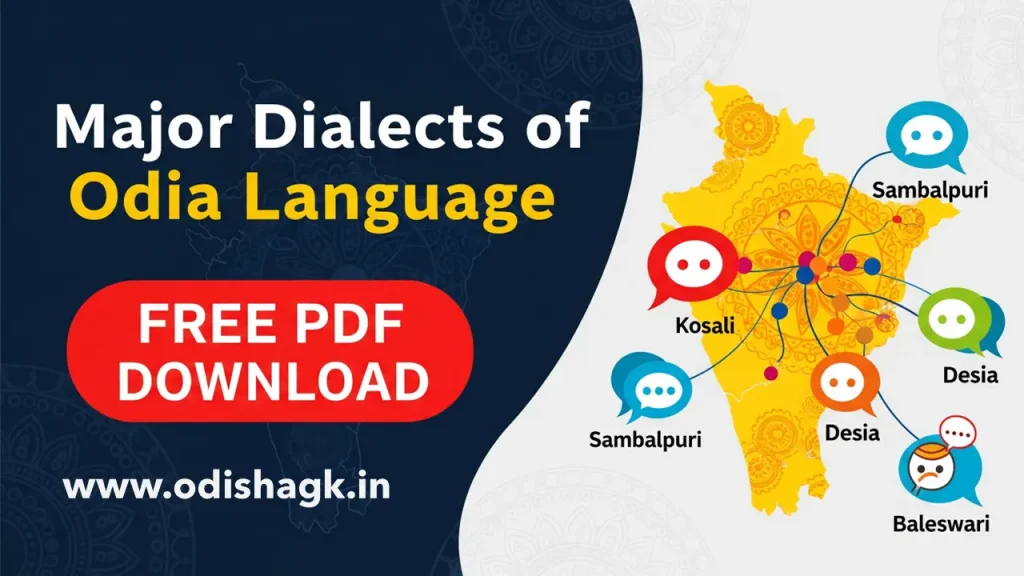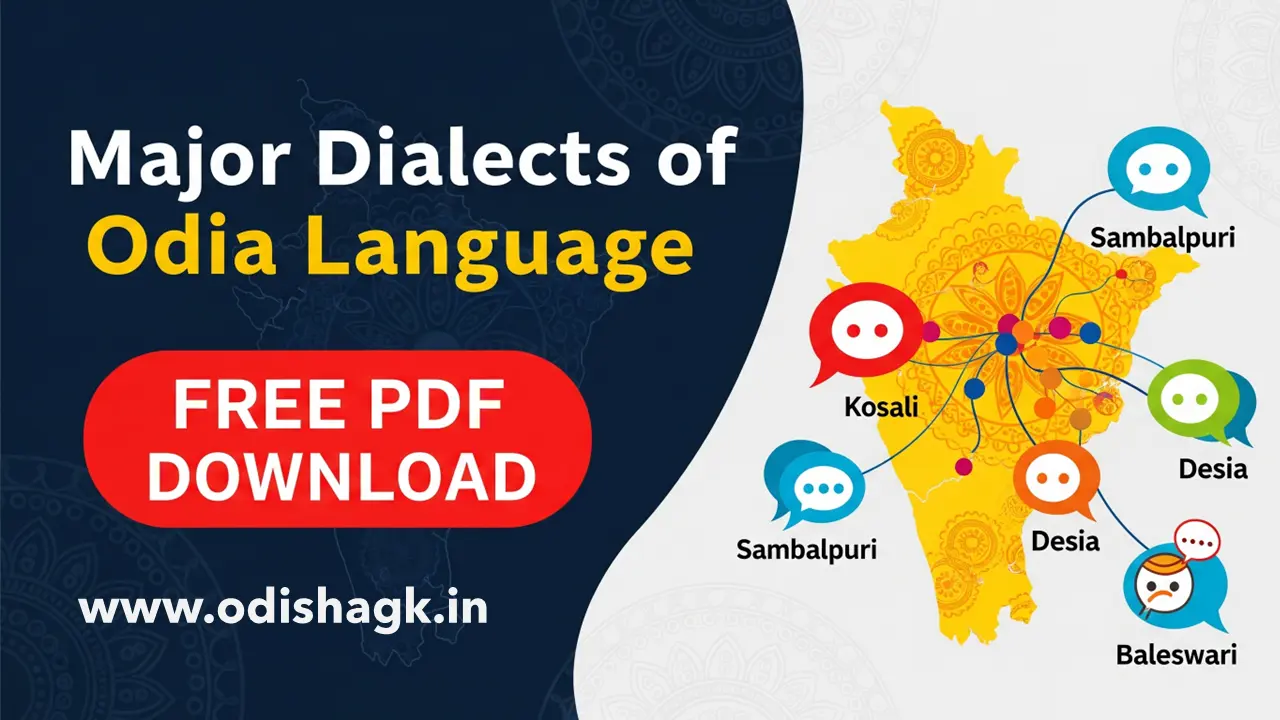Major Dialects of Odia Language
Major Dialects of Odia Language: Odia, also known as Oriya, is one of the official languages of India primarily spoken in the state of Odisha. Like any other living language, Odia has evolved and diversified over centuries giving rise to various regional dialects across the state. While they share the core vocabulary and grammar, these dialects differ in terms of pronunciation and local lexicon.

Table of Contents
Let’s explore some of the major dialects of Odia spoken in different parts of Odisha.
| Name Of the Post | Major Dialects of Odia Language |
| Category | Odisha GK |
| Help For | Odisha Competitive Exam |
| Download PDF FREE |
Major Dialects of Odia Language: Notes for OPSC Exam
1. Introduction to Odia Language & Dialects
- Odia (formerly Oriya): An Eastern Indo-Aryan language primarily spoken in the Indian state of Odisha.
- Official Status: Official language of Odisha and the second official language of Jharkhand. Also spoken in parts of West Bengal, Chhattisgarh, and Andhra Pradesh.
- Classical Language: In 2014, Odia was designated as one of India’s six Classical Languages, recognizing its long literary history and distinct evolution.
- Dialects: Due to geographical variations, historical influences, and tribal interactions, Odia has developed several regional dialects, each with unique phonological (pronunciation), morphological (word formation), lexical (vocabulary), and sometimes syntactic (sentence structure) differences.
2. Major Regional Dialects of Odia
The Odia language can be broadly classified into several regional dialects based on their geographical distribution.
- Mughalbandi Odia / Standard Odia / Central Odia:
- Region: Predominantly spoken in the coastal and central districts of Odisha, including Cuttack, Khordha, Puri, Nayagarh, Jajpur, Jagatsinghpur, Kendrapara, Dhenkanal, Angul, and parts of Boudh.
- Significance: This dialect is generally considered the standard form of Odia and is used in official contexts, media (newspapers, television, radio), and formal education. The Cuttack variant is sometimes specifically referred to as Katakia Odia.
- Influence: Has been historically influenced by the administrative and literary centers located in this region.
- Sambalpuri Odia / Western Odia (Kosali):
- Region: Widely spoken in the western districts of Odisha, including Sambalpur, Bargarh, Bolangir, Sonepur (Subarnapur), Boudh, Deogarh (Debagarh), Nuapada, and Kalahandi. It also extends to adjoining parts of Chhattisgarh.
- Significance: Often considered a distinct language by its speakers and some linguists, advocating for its recognition as Kosali language. It has a rich oral tradition and a growing body of written literature.
- Characteristics: Differs significantly from Standard Odia in terms of vocabulary, pronunciation, and certain grammatical structures. It has influences from neighboring Hindi and Chhattisgarhi.
- Ganjami Odia / Southern Odia:
- Region: Spoken in the southern districts of Ganjam, Gajapati, and parts of Kandhamal districts of Odisha. Also extends to parts of the Srikakulam district of Andhra Pradesh.
- Characteristics: Features unique vocabulary and pronunciation, and shows influence from the neighboring Telugu language. The variant spoken in Berhampur is sometimes known as Berhampuria Odia.
- Baleswari Odia / Northern Odia:
- Region: Spoken in the northern districts of Balasore, Bhadrak, and Mayurbhanj.
- Characteristics: Displays distinct vocabulary and pronunciation patterns, showing influence from the neighboring Bengali language due to geographical proximity and historical connections.
- Desiya Odia / South-Western Odia:
- Region: Spoken in the southwestern tribal-dominated districts of Koraput, Rayagada, Nabarangpur, and Malkangiri.
- Characteristics: Often considered a blend with significant tribal language influences. It’s a key means of communication in the tribal belts of Southern Odisha.
3. Other Notable Dialects and Sociolects
Apart from the major regional variations, there are several other local and tribal dialects/sociolects:
- Bhatri: Spoken in parts of Southwestern Odisha (Kalahandi, Nabarangpur) and Bastar district of Chhattisgarh. It’s a transitional dialect.
- Phulbani Odia: Spoken in Phulbani town and surrounding areas of Kandhamal and bordering Boudh.
- Sundargadi Odia: Spoken in Sundargarh district and adjacent areas of Odisha, Chhattisgarh, and Jharkhand. Sometimes grouped under Western Odia.
- Halbi: Primarily spoken in the Bastar district of Chhattisgarh, but also by some communities on the Odisha border. It’s a mixture of Odia, Marathi, and Chhattisgarhi tribal languages.
- Aghria: Spoken by the Aghria community in Western Odisha.
- Laria: Spoken in bordering areas of Western Odisha with Chhattisgarh.
- Tribal Dialects: Many tribal communities in Odisha speak Indo-Aryan dialects that are forms of Odia or heavily influenced by it. Examples include:
- Bodo Parja / Jharia: Spoken in Koraput district.
- Kalahandia Odia: Spoken in undivided Kalahandi district.
- Kupia: Related to Odia, spoken by Valmiki people.
- Sounti, Bathudi, Bhuyan, Kondhan, Kurmi, Matia, Reli, Sadri: These are specific to various tribal communities or castes in different parts of the state and often show unique lexical and phonological features.
Cuttack-Khurda Dialect:
Spoken in the districts of Cuttack, Khurda, Nayagarh and parts of Puri, this is considered the standard dialect of Odia. It is based upon the language used in ancient Odia scriptures and literature. Some key features include the use of aspirated consonants like “kh” and retroflex sounds like “ṭṭa”.
Odisha GK with This Comprehensive Book for Just Rs. 29/-
Don’t miss this chance to boost your preparation for Odisha state exams. To help you prepare effectively for these exams, we have launched an all-inclusive Odisha GK book covering all topics from the state. Normally available at Rs. 200, we are offering it at an unbelievable price of just Rs. 29 for a limited period!

Sambalpuri Dialect:
Predominantly used in western Odisha districts like Sambalpur, Bargarh, Jharsuguda etc, Sambalpuri has influences of Rajasthani and Hindi languages. It exhibits softer pronunciation of consonants and different terms for objects and customs in daily life. E.g term for brother is “bhaiya”.
Berhampur-Ganjam Dialect:
Spoken in southern districts of Ganjam and Berhampur, it shows impact of Telugu culture with borrowed words and vowel-heavy pronunciations. The tone and intonation also differ compared to other variations. E.g word for sister is “adda” instead of general “didi”.
Mayurbhanj Dialect:
Predominant in northern Mayurbhanj region bordering West Bengal, this dialect exhibits similarities with Bengali language. Some unique terms used are- ‘kheyali’ for farmland instead of ‘jada’. Pronunciation of ‘o’ and ‘ô’ vowels also vary from standard Odia.
Baleshwar Dialect:
Spoken in coastal Baleshwar district, this marine-influenced dialect shows impact of local seafaring traditions. Terms like ‘banai’ for ship, ‘ghawra’ for small fishing boats were assimilated. It also loses distinction between ‘o’ and ‘u’ vowels at times.
| Baleswari | Odia This dialect is spoken in Baleswar, Bhadrak and Mayurbhanj district of Odisha. |
| Bhatri | This dialect is spoken in South |
| Western Odisha. | |
| Desiya Odia | This dialect is spoken in Koraput, Rayagada,Nabarangapur and Malkangiri districts of |
| Odisha Ganjami Odia | This dialect is spoken in Ganjam and Gajapati districts of Odisha. |
| Kataki Odia | This dialect is spoken in Cuttack, Jajpur, Jagatsinghpur and Kendrapara districts of Odisha. |
| Puri Odia | This dialect is spoken in Puri district of Odisha. |
| Sambalpuri Odia | This dialect is spoken in Baragarh, Balangir, Boudh,Debagarh, Nuapada, Sambalpur and Subarnapur districts of Odisha. |
| Halbi | This dialect is spoken in Bastar district of Chhattisgarh.Halbi is a mixture of Odia and Marathi with influence of Chhattisgarhi tribal languages. |
| Phulbani Odia | This dialect is spoken in Phulbani Town, Khajuripada block of Kandhamal and in nearby areas bordering Boudh district. |
Q. What is the standard dialect of Odia?
A. The Cuttack-Khurda dialect is considered the standard dialect as it retains traits of classical Odia.
Q. Which Odia variety is closest to Bengali?
A. The Mayurbhanj dialect spoken near the West Bengal border shares most similarity with the Bengali language.
Q. Which dialect shows most influence of Hindi?
A. The Sambalpuri dialect bordering states like Chhattisgarh and Jharkhand exhibits pronounced Hindi influences.
Download Here PDF Here

